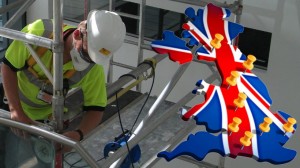Repairing scratch & mineral damaged glass not only saves time and money, it benefits the environment too.
The UK glass manufacturing industry (one of the most environmentally conscious in the world) produces an average 10,137 tons of glass every day in the UK.
Each ton of glass manufactured produces 1.65 tons of CO2.
That equates to 16,726 tons of CO2 being released in the everyday and that’s just in the UK.
Glass is a heavy commodity, so once you factor in its transportation after manufacture, the environmental impact is even greater. Greater still is the impact involved in the extraction, mining, refining and transportation of the raw materials used in the production of glass, none of which could be described as benign.
It is true that glass is being recycled more than ever before, with some producers claiming up to 45% of recycled glass (or cullet) being used in their products, and this is a great achievement.
Unfortunately, the glass most recycled is not that used in building or furniture, but that which holds your beer and wine – bottle glass. Construction glass normally ends up on landfill sites and is rarely reused in its original form.
We could harp on about the evils of glass manufacture and how it pollutes our environment, but that would be pointless. Glass is a necessity in the modern world and its benefits far outweigh its cost, both financially and environmentally.
Finished glass is inert and non-toxic. It is easy to clean and maintain, having a dense surface, which inhibits contamination. Glass is the prime ingredient in ‘passive solar’ designed buildings, that harness the heat of the sun to warm structures without the need for machine based heating and air conditioning.
Glass is also hugely versatile and provides quicker and cheaper building methods for modern construction. Just take a look around you and see how many buildings use glass as their primary component.
But probably most of all, given that the average person now spends 90% of their time indoors, the sanity provided by being able to see more of the outside world is worth more than any therapist and is proven to boost employee productivity and sense of well being.
OK, let’s add a little perspective to this. Let’s take an average family car, a Ford Focus, 2008, 1.6, diesel, one of the best available in relation to the environment, producing an av. 185 grams of CO2 per mile.
The average car windscreen weighs 15 kilos. If 1 ton of glass produces 1.65 tons of CO2 during production, then roughly speaking, to manufacture the windscreen produces 24.75 kilos of CO2. Almost twice its own weight.
Let’s take a trip in our family car from the centre of Birmingham to Big Ben in London, according to Google that’s 102 miles. So 102 x 185 = 18,870 grams of CO2 = 18.87 kilos = 1.26 windscreens. 2.5 windscreens if you include the drive home.
Manufacturing 10,137 tons of glass every day in the UK produces 16,726 tons of CO2 every day. That equates to driving our economical, environmentally friendly family car 3,094,310 miles a day. Just a little further than your average warranty.
We could go on and on quoting figures and statistics about pollution and killing the planet or whatever the latest scares maybe today. The truth is that we are never going to stop pollution. We need and rely too heavily on products, services and luxuries that produce pollution. Apparently 14% of all greenhouse gas emissions come from cows and sheep, with your average cow producing up to 1500L of CO2 and 350L of Methane per day. This is according to the New Zealand Flatulence Tax figures. I know, the mind boggles. I hope David Cameron does not adopt this idea. If he does, the wife will have to go.
Reducing your carbon footprint
In reality, the best we can do is look towards limiting and maybe offsetting the pollution we do cause. We are never going to stop using our cars, we will always manufacture glass and we will always eat meat and drink milk.
Removing scratch and mineral damage from glass by using glass polishing systems and services, reduces the amount of glass we need to manufacture, which in turn reduces the CO2 emissions produced during manufacture.
Repairing scratch and mineral damaged glass is not going to save the planet, but it does help, and that’s the important thing. In an age where we are all expected to do our bit for the planet, glass polishing offers solutions that not only save time and money; it offers a truly green alternative to fitting replacements.
Think of it this way. Every scratched glass unit you have repaired rather than replaced is equivalent to driving your car 100 miles.


